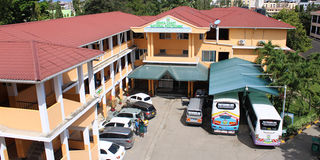Star shines at the Kenya Coast National Polytechnic, and here’s why
Sponsored by Kenya Coast National Polytechnic

A section of the Kenya Coast National Polytechnic.
By Mary Muthoka, Chief Principal, Kenya Coast National Polytechnic
On March 2, 2023, a star shone brightly at the Kenya Coast National Polytechnic (KCNP) when a ‘galaxy’ of qualified graduands got their diplomas and certificates, having completed their studies to the satisfaction of their trainers.
The graduation ceremony saw 1,811 new graduates exit the college and effectively enter the job market. kudos to them all and best wishes as they move on to the next chapters of their lives.
KCNP is a premier TVET institution located in Kenya’s coastal region. Owing to its dedication to quality training, its graduates tend to do well in the job market. The successes it has registered owes to the strategic investments it has made of the years, and others that it continues to pursue. This article highlights some of the more recent initiatives and achievements.
Competency-Based Education and Training (CBET) Curricula
In collaboration with relevant industry stakeholders, particularly in Hospitality and Tourism, Electrical Engineering, and Marine and Port Logistics, KCNP has developed 19 Competency-Based Education and Training (CBET) curricula. Out of these, 10 have already been validated and approved by the Technical and Vocational Education and Training Authority (TVETA). We have already recorded enrolments in Bartender, Pastry, and Industrial Control Installations.
Recognition of Prior Learning
The Polytechnic is now authorised under the Kenya National Qualifications Authority (KNQA) to launch the Recognition of Prior Learning (RPL) programme – a process that involves identifying, assessing, and certifying skills and competencies acquired in non-formal or informal training. This will help many Kenyans to acquire certificates that match their skills, thus helping them access employment. The initiative will enhance labour mobility as well as promote lifelong learning, social inclusion, and self-esteem.
RPL is in line with the National Government’s commitment to provide a platform for recognition and certification of a huge segment of the population, mainly the youth, who have acquired various competencies through the informal (Jua Kali) sector.
Implementation of Beneficial Partnerships
Kenya Education for Employment Programme (KEFEP) and Young Africa Works, which are supported by the Governments of Kenya and Canada, have supported key skills gap areas identified by the industry in Hospitality and Electrical Engineering. Through this partnership, two students travelled to Canada in September 2022 for a four-month exchange programme at Nova Scotia Community College. It is gratifying to note that both students were offered employment opportunities at Prince George Hotel, Halifax City in Nova Scotia, upon completion of their studies.
Further, through the collaboration with Colleges and Institutes Canada (CICan) and the Ministry of Education, Kenya Blue Economy Skills Training Programme (KBEST) was launched. The project will enhance the Polytechnic’s capacity to deliver skills training programmes that meet international standards and respond to the needs of the industry.
East Africa Skills for Transformation and Regional Integration Project at the Final Phase
In January 2018, KCNP was competitively selected by the Government of Kenya and the World Bank to be a Regional Flagship TVET institution under the East Africa Skills for Transformation and Regional Integration Project (EASTRIP). The project is designed to address skills shortage and mismatch in East Africa, by providing technical, financial, and industry partnerships to increase access to and improve the quality of training programmes. It is further structured to facilitate regional integration through the exchange of students, policies, and practices, as well as to enhance faculty mobility and harmonisation of standards and qualifications.
After years of painstaking planning and preparation, the construction phase of the project commenced on December 5, 2022 at Waa, Kwale County, where the Marine Transport and Port Logistics Centre will be based.
Related to the project, student and staff exchange programmes are ongoing between the Polytechnic and the National Institute of Transport (NIT) in Dar es Salaam, Tanzania. Currently, 22 students from NIT are at KCNP pursuing a short course on Solar PV.
Greening TVET
In support of the Kenya Government’s call to green TVET, KCNP has started rolling out solar lighting, beginning with security lighting in 2018. We shall pick up and continue with the programme in the current calendar year.
On the side of tree planting; again, for the last six years, we have planted close to 1,000 trees, our small compound notwithstanding. We shall continue to do so to significantly contribute to the President’s target of 15 billion trees by the year 2032. We have also built water harvesting tanks for clean drinking water, with the capacity to collect 280,000 litres. Additionally, we have changed from firewood to cooking gas, and all new curricula have an inbuilt green element. This is just to highlight a few of our environmental protection and climate change mitigation measures.
Rebranding TVET
On rebranding TVET, we have made a mark in distinguishing and repositioning KCNP in the TVET sector, nationally and regionally, through well-planned strategies. On industry linkages, we have started the journey and enjoy strong relations with industry in the Coast Region and beyond. Many have offered great support in curriculum development, and students’ attachment and internships, among others.
Appreciation
We appreciate the County Government of Kwale, the Chitsakamatsa Community, and leaders from Kwale County in general, for donating 40 acres of land in Waa area, for the construction of the Maritime School under EASTRIP. We also thank Mr Chris Wilson for donating 15 acres of land in Kilifi for expansion of the Polytechnic.
We recognise and thank the Polytechnic Governing Council that completed its term of office in November 2022, for steering the institution to greatness. Finally, we appreciate the Government for continuing to support Kenya Coast National Polytechnic through employment of competent trainers, and timely disbursement of Government funds, including HELB loans to support trainees. Of special note is the ongoing promotion of trainers.
Request
Lastly, we ask for infrastructural development funding because we are short of academic space.
For more information, visit https://kenyacoastpoly.ac.ke/


